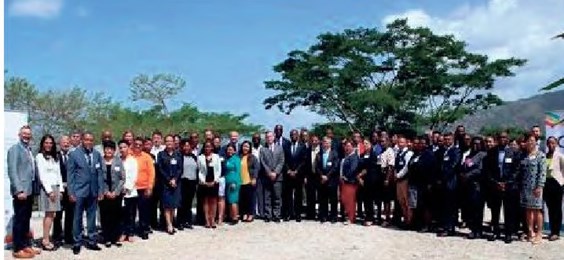By BRENDAN TARNAY IOM / Central America
Port of Spain – The growing frequency and intensity of tropical storms and other natural disasters have pushed Caribbean countries to prioritise their response planning. Tackling the challenges of human mobility in the context of disasters and climate change in the region has become a top concern.
This was the focus of a meeting in Tobago, Trinidad and where 18 Caribbean countries and territories and 12 international and regional organizations, as well as observers, gathered last week (6-7 June).
Organized by the International Organization for Migration (IOM) under the framework of the Caribbean Migration Consultations (CMC), the recent event also was supported by the Platform on Disaster Displacement (PDD) and the UN Refugee Agency, marking the second regional meeting aimed at supporting technical specialists and government officials to identify gaps related to disasters and displacement and developing policies to enhance the re gion’s overall preparedness and response capacity.
“The participation of so many Caribbean countries and territories demonstrates the importance that the region places on addressing together the impacts of climate change on human mobility,” said Marcelo Pisani, IOM Regional Director for Central America, North America and the Caribbean. “Regional cooperation represents a key opportunity for the future. The Caribbean Migration Consultations foster these exchanges on migration issues. Our hope for the CMC is that it enables discussions on migration and climate change and will build on the momentum created from this conference.”
The discussions focused on four thematic issues: managing disaster displacement risks and the inclusion of human mobility into national and regional disaster risk reduction (DRR)
policies and adapting planning processes; migration as adaptation to environmental and climate change; protection challenges in the context of human mobility in countries affected by disasters; and addressing cross-border disaster-displacement (migration law and policies).
“Caribbean countries and regional institutions have made great advances in preventing and addressing environmental migration,” says Pablo Escribano, IOM regional specialist on Migration, Environment, and Climate Change. “Consolidating these initiatives and sharing best practices represent great opportunities to design a way forward and address the challenges together.”
Among the participants were representatives from countries and territories such as Antigua and Barbuda, Aruba, Barbados, Belize, British Virgin Islands, Cuba, Curaçao, Dominican Republic, Grenada, Guyana, Jamaica, Saint Kitts and Nevis, Saint Lucia, Saint Vincent and the Grenadines, Sint Maarten, Suriname, Trinidad and Tobago, and Turks and Caicos Islands.
Other institutions were also represented at the event, such as the embassies of the United States, Switzerland, and the Kingdom of the Netherlands, as well as international and regional organizations such as CARICOM IMPACS, the Caribbean Community Climate Change Centre, CDEMA, OECS, UNHCR, ECLAC, PDD, the German Development Cooperation, academic institutions.










No Comment